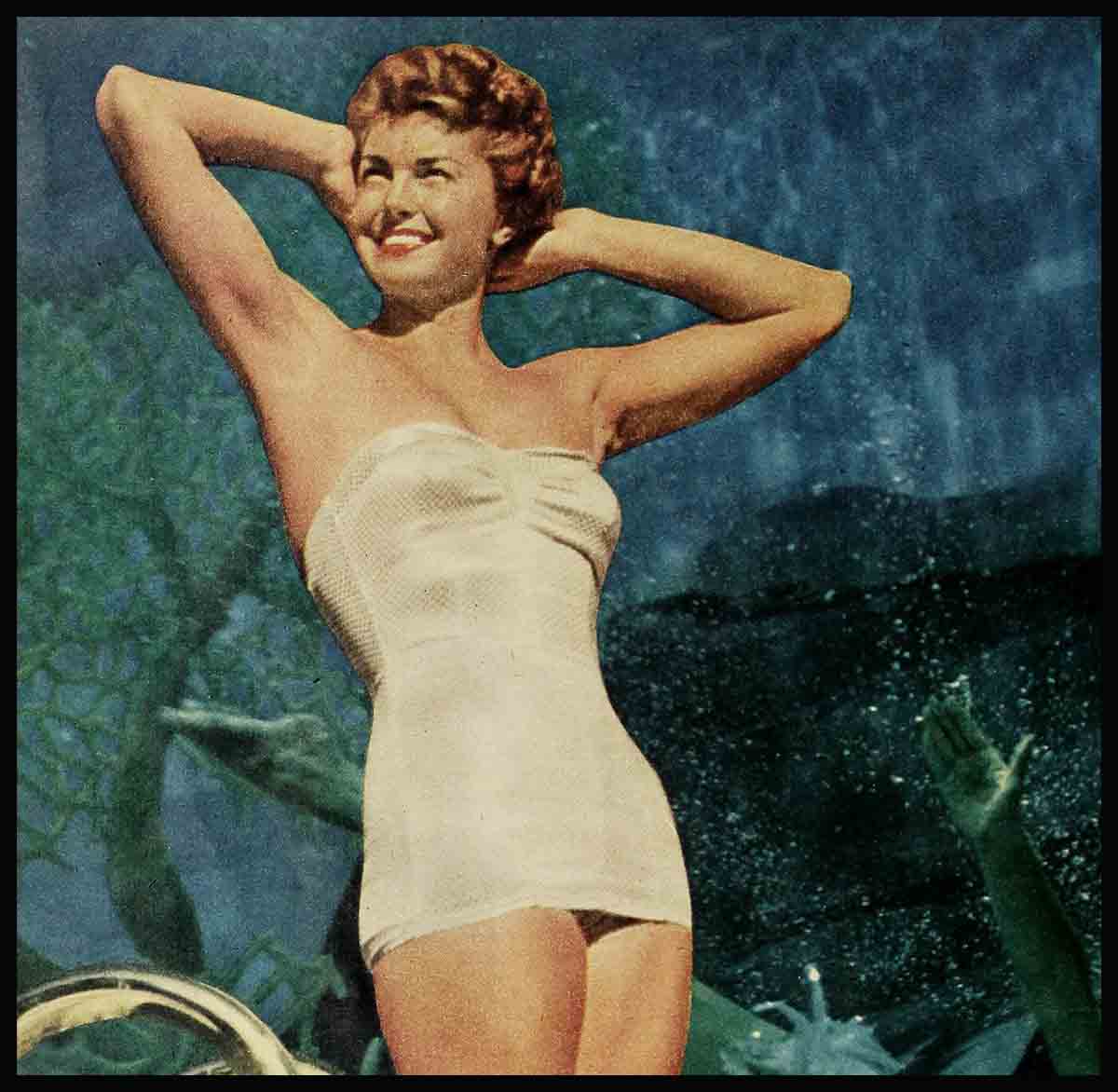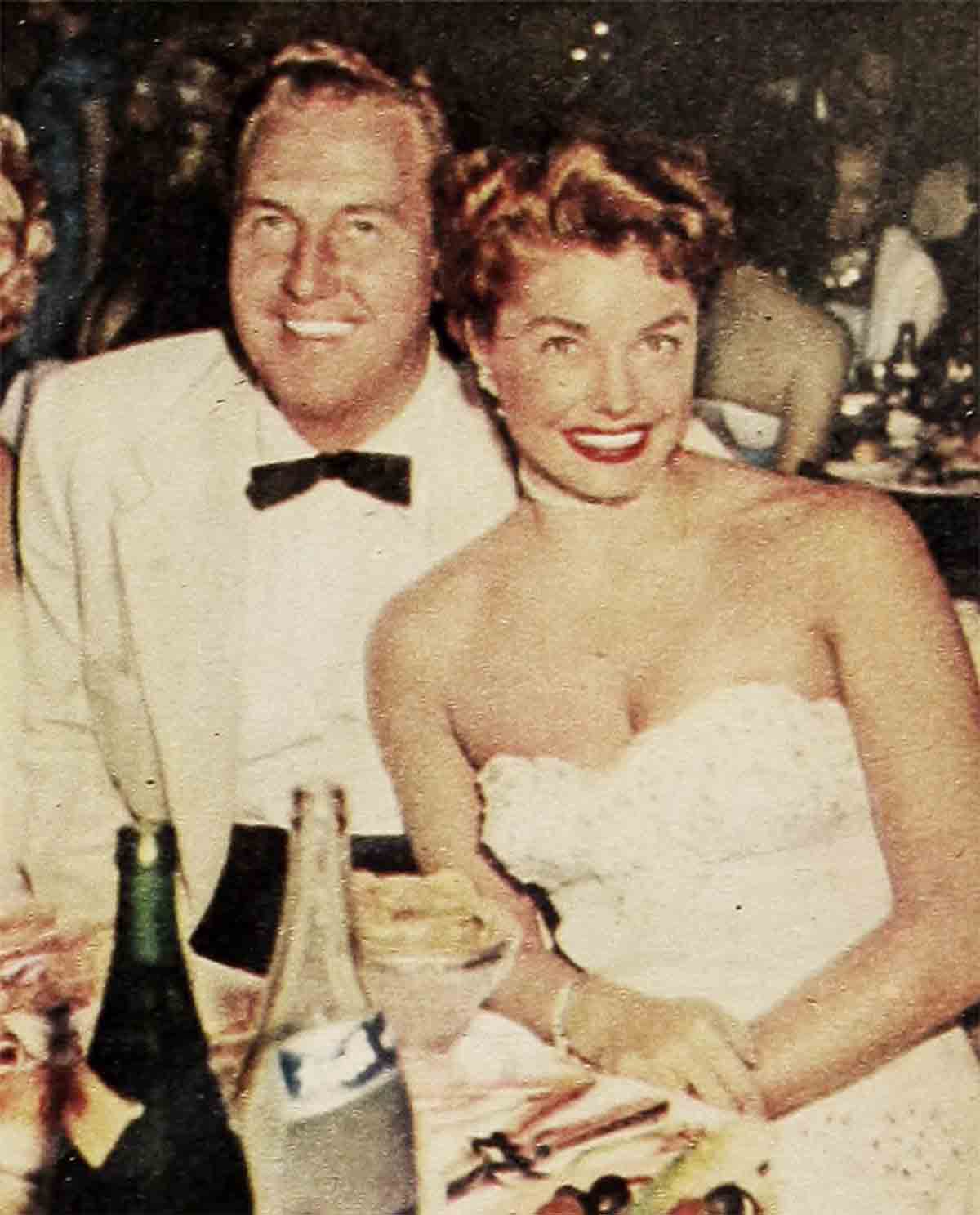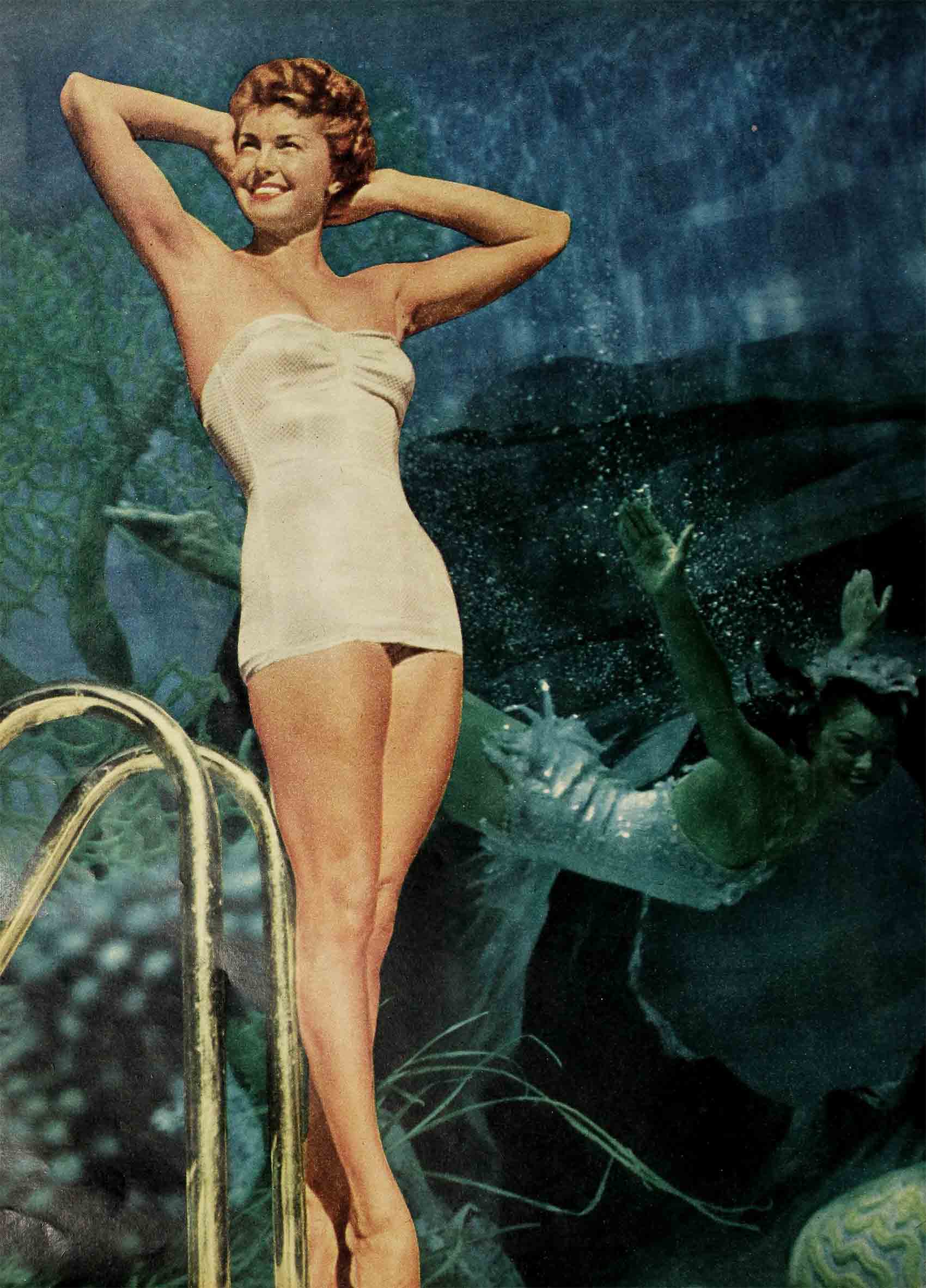
What’s The Trouble, Esther Williams?
On Tuesday, November 25th of this year, Esther Williams will celebrate her seventh year of marriage to Ben Gage.
This means she will rise at 6:00 a.m., take a plunge in her heated pool at 6:15, feed the children if they’re awake at 6:30, arrive at the studio by 7:00, appear on the set by 8:00, work eight or nine hours, then rush home to spend a few minutes with her Benjie and Kimmy before they’re put to bed.
Should Esther and Ben decide to live it up a little and celebrate their anniversary, say by going to the Mocambo or dancing at Ciro’s—incidentally, this spectacularly tall couple dance very well together which isn’t too true of most Hollywood couples—you can bet even money that on the following morning at least one gossip column will carry an item to the effect that Esther’s seventh wedding anniversary will probably be her last with Ben Gage.
Every year for seven years now, the columnists have been predicting—and here is a direct quotation—that “This is one marriage that can’t last.”
A few weeks ago, for example, a syndicated columnist who happens to b friend of the Gages and is usually careful about printing break-up rumors, told his readers that the domestic bickering between Esther and Ben had reached the boiling point.
When Esther was asked to comment on the item, she merely shrugged those broad, well-muscled shoulders of hers. broke into a wide grin, and said, “There’s no truth to it at all. Ben and I have never been happier. Maybe we quarrel once in a while, but who has time to fight? We’re both too busy.”
Ben, who was once a radio announcer and consequently talks with great fluidity, was a little more detailed in his denial. “Esther and I,” he explained, “have read so many of these darn items about ourselves, they don’t bother us anymore. You know why they print this stuff, don’t you? They’ve run out of things to write about us. After all, pick up the front page of your newspaper. You don’t read anything about Mr. and Mrs. Glutz celebrating their tenth wedding anniversary. That’s not news. You read scandal about divorces, law suits, murders—those are the things that sell newspapers—not happiness.
“Esther and I happen to be happily married and well-adjusted. I’d say as well as any couple in town. Is that worth any kind of a story? You know the answer. Of course not. But run something like Esther Williams and Ben Gage are breaking up—right away it’s hot stuff.
“If there was anything wrong with our marriage, I mean seriously wrong—if it were going on the rocks—I’m the kind of guy who would level with you. But it isn’t. Ask Esther. Ask her mother. Ask anyone. The trouble is that these columnists have done all the stories they can do about a happy marriage. Now they’ve poe concentrate and dig up a little dirt.”
Ben’s explanation sounded rational. “Only,” I asked, “why should they pick on you and Esther? Why don’t they pick on someone say, like Loretta Young and Tom Lewis, or Bob and Dolores Hope? Is there a possibility that many members of the Press don’t like Esther? A year or so ago the Hollywood Women’s Press Club voted her the most uncooperative actress of the year. Are these stories of as breakup examples of wishful thinking?”
Ben thought for a moment. “I honestly think,” he said, “if you asked the membership of the Hollywood Women’s Press Club if they’d made a mistake about Esther, they’d say yes. Quite a few of those girls resigned after that wacky nomination. Esther is as cooperative with the Press as circumstances permit. Don’t take my word for it. Just ask about town.”
I did exactly that, and from what I can gather, the Press feels that Esther Williams is a pretty good scout. “She’ll give you as much time as she can,” one reporter confided, “but to her the most important thing is her family, especially her two kids: Her one regret in life is that she can’t spend more time than she does with her boys. She’s always late for appointments, and she may be a little overanxious about earning a buck—but she’s a whole lot more normal than someone like Ava Gardner who’s a real mixed-up dame, or Lana Turner who has about as much judgment of men as a mink. I think you can say this about Esther. The newspapermen genuinely like her. The newspaper women, however—I think they’ve got green eyes.
“The one trouble with Esther is that she’s a success. It’s a national hobby, taking potshots at a success, especially when the girl had nothing to begin with. Esther’s story is one of those rags-to-riches yarns. No one criticizes the son of J. P. Morgan. Such a kid is born to the purple and no one ever accuses him of being money-mad, aggressive, selfish, egotistical, and inconsiderate.
“Let someone like Esther come along, a kid who never had an extra buck as a child, and right away a lot of other girls resent her success.”
A Hollywood newspaper girl who’s been covering the goings-on in movietown for more than six years had a different explanation for the oft-repeated rumors concerning the eventual unhappy denouement of Esther’s second marriage.

“Look,” she said, “let’s start on the premise that all single girls are jealous of married girls, and all women insanely jealous of beautiful actresses. Let’s shove that premise aside and concentrate on Esther. I’ve done quite a bit of research on Esther, and I’ve come to the conclusion that she’s a pretty domineering sort of girl.
“I don’t think there’s anything necessarily wrong in a girl being dominant. After all, we’re just the result of our inheritance and environment. It so happens that Esther’s mother is a pretty domineering woman herself. I remember asking people in Inglewood, where Esther was raised, about her family. They all told me the same thing. Esther’s mother was the driving force. Her father was a poor sign-painter who found the going pretty tough, that is financially. Esther inherited her mother’s drive, her mother’s forcefulness. She’s a plain-speaking, hardworking girl who calls a spade a spade.
“It’s her industry, her money, her earnings, her career which in large part is responsible for the family holdings. For example, Esther and Ben own the Trails, a restaurant out on Sepulveda Boulevard in Los Angeles. It’s done so well that Esther and Ben are expanding it into a drive-in. They also own a metal fabrication shop, half-a-dozen houses down in the desert which Esther built in the first place so that her asthmatic brother would have something to look after, another house in Acapulco which they rent out, and I guess some sort of royalty deal with a bathing suit manufacturer. At one time they also owned a filling station at 18th and Montana in Santa Monica; I’ll never forget the night they opened that station. They had searchlights and Keenan Wynn on his bicycle and they were giving away tanks of free gas to other Hollywood stars.
“I happened to stop by another filling station in the neighborhood, and the youngster who was running it was choked with bitterness. ‘That Esther Williams is a pip,’ he complained. ‘She only earns $100,000 a year, but she’s gotta open up a filling station and take away my business. I know it’s a free country. Anyone can open anything. But somehow, I just resent it. I resent it, ’cause I know she doesn’t need the money. It’s just another sideline to her, while to me it’s my whole living.’
“Esther and Ben gave up the filling station, but my whole point in telling you about their holdings is this: Esther is the dominant wage-earner in her family. Ben looks after their various interests. He had a small run as a singer on the radio, and as an emcee on television, but he abandoned show-business.
“It may be unfair but he is regarded more as Esther Williams’ husband than as Ben Gage. He knew this was bound to happen when he married Esther. He knew she wasn’t going to abandon her career and let him become the family bread-winner. He went into the setup with his eyes open.
“I maintain that eventually he is going to regret having left show business. After all, he’s tall, he’s handsome, he’s got a lot of sex appeal. If he were willing to struggle a little, who could tell what heights he might achieve? He’s given up whatever chance he had in show business to look after the joint family holdings. These may expand to include 5,000 different restaurants, but Esther will always be the power behind the throne. Eventually, and mind you, this is my own personal opinion, I think Ben’s male vanity will assert itself, that unconsciously and gradually, he will resent Esther for depriving him of the chance he himself failed to take in show business. Do I make myself clear?”
I mulled over my informant’s opinion for a good while. “You don’t mean to say,” I questioned, “that on the basis of this analysis which may be faulty you have been running breakup stories about the Gages?”
The newspaper girl looked at me and sadly shook her head. “It’s very simple,” she explained. “History repeats itself. I’ve yet to see a happy marriage out here where the wife was infinitely more successful in her career than her husband. In those marriages that do last, either the wife or the husband must abandon one career. Lots of times a man will marry an actress and become her manager in which event he not only becomes her husband but also a paid employee. Sid Luft and Judy Garland are a case in point. Rosalind Russell also has a husband who helps produce many of her pictures. Tom Lewis has just organized a television company which will star his wife Loretta Young.
“I maintain that the masculine ego resents being placed in a subsidiary role and that eventually it will revolt—maybe not in all cases—after all, a question of character is concerned—but in most cases. The reason many gossip columnists keep predicting the demise of Esther Williams’ marriage is a simple one. Through her ambition and industry she is more successful than her husband. I don’t say this is a fault, a crime, or anything. I merely say it’s dangerous. Why don’t you talk to someone who knew Esther when she was first married to that struggling young doctor?”

I searched around Los Angeles and had no trouble in finding several persons who knew Esther when she was the young doctor’s wife. One of these persons remembers Esther when she lived at 8722 Orchard Street in Inglewood. In fact, she attended school with the actress and says that Esther today is a far better wife, more mature, more intelligent, more philosophical than when she was married to the young doctor who was more interested in research than in making money.
“Look,” she told me. “I think Esther Williams is wonderful. I’ve heard an awful lot of stories of how she values money above everything and all of that baloney. It’s not true. She has a good common sense of values. In her scheme of things, money is important—but she was raised without very much of it—and she never knew an easy childhood. I can vouch for that because I lived in the same neighborhood.
“I remember when she worked in a local store selling underthings on Saturdays and during vacations. I remember when she was a stock girl in a department store on Wilshire Boulevard, earning $80 a month. She and her sister used to save admission to the public swimming pool by counting out towels.
In high school at the beginning she was pretty unhappy. She was tall and gangling and none of the boys made a play for her. Towards the end, however, she began going around with some of her brother’s friends and getting elected to various school offices, and by the time she got out she was pretty darn popular—but she never had it easy. I think she was 15 when the Los Angeles Athletic Club became interested in her as a swimmer. They sent her out to Des Moines, and I think she was 17 or 18 when she won the 100-meter free style event. But as she once told me, “You can’t earn money as an amateur athlete,’ so she gave up swimming and got a job in the department store. That’s when Billy Rose offered her $40 a week to swim in his World’s Fair Aquacade.
“She turned it down telling him, ‘I can’t give up the security of my job for $40 a week.’ Rose finally came across with $125 a week, and Esther took him up on it.
“While she was swimming with Johnny Weissmuller, Sam Katz, a producer at MGM, and Johnny Hyde, he was the agent from the William Morris office who later discovered and developed Marilyn Monroe—tried to get her into the movies—only Esther wouldn’t listen. That’s what I mean by common sense. She knew she’d had no dramatics training, and she couldn’t see what use she’d be in the movies. She told them no, and after the Aquacade, she got her same old job back in the department store over on Wilshire Boulevard.
“Johnny Hyde used to bother her every month or so to come over to see L. B. Mayer—he was head of MGM, you know. He wanted Esther to have an interview with Mr. Mayer. He felt strongly that Esther could be turned into a big boxoffice attraction. Esther went with him one day—she was 19 at the time—and Mayer’s first reaction was, ‘My, but you’re tall’ Esther said, ‘I certainly am,’ and she tried to leave his office, but Mayer ran after her and said, ‘Wait a minute, young lady, you’re not that tall.’ He liked her face and her figure, and he took a chance. That’s how Esther became a movie star.
“Now when she married this young doctor, it wasn’t a case of running away from parental authority or anything like that—it was love, or what Esther thought was love. I don’t see any sense in mentioning his name, do you? Ben gets absolutely livid, you know, when anyone mentions his name or even the fact that Esther was married before. I don’t know why, but he certainly does. Anyway, it’s no easy job being a young doctor. It takes years before you start earning a decent living. I think Esther would have put up with the early struggle and everything else, but she just fell out of love. Luckily she fell into a career almost at the same time.
“You ask me if I think there’s any possibility of a breakup in Esther’s present marriage. Right now I’d say definitely not. Esther and Ben are both on a solid plane. They know what they want out of this marriage. It’s a family, and they’re building one. Esther wants a girl, and next time out she’ll probably get one.
“Ben may kid around a lot, and because he’s so big he’s always a target for jokes and wisecracks, but really, he’s an a good father. The other morning he took little Benjie down to the Hill and Dale Nursery, and I’m telling you the both of them looked real cute. Esther is as hard-working an actress as you’ll find in this town. Being a wife, mother, and actress is no easy job. At the end of a day she’s really all in. But she always has time for the sick and the handicapped, like teaching little blind children to swim and performing for the paraplegics.
“I read those gossip items from time to time about Ben and Esther—but I also see a lot of these two kids, and I can tell you their marriage is working. Insofar as those darn gossipmongers are concerned the trouble with Esther Williams is that there’s no trouble. She’s happy, Ben’s happy, the children are happy—and that’s all there is to it.”
And that’s all they have to work on, those gossip columnists who, for some perverse reason refuse to believe that any family can be happy in Hollywood. And refuse to allow anyone else to believe it either.
THE END
—BY MARSHA SAUNDERS
(Esther Williams will soon be seen in MGM’s Million Dollar Mermaid.)
It is a quote. MODERN SCREEN MAGAZINE DECEMBER 1952





No Comments